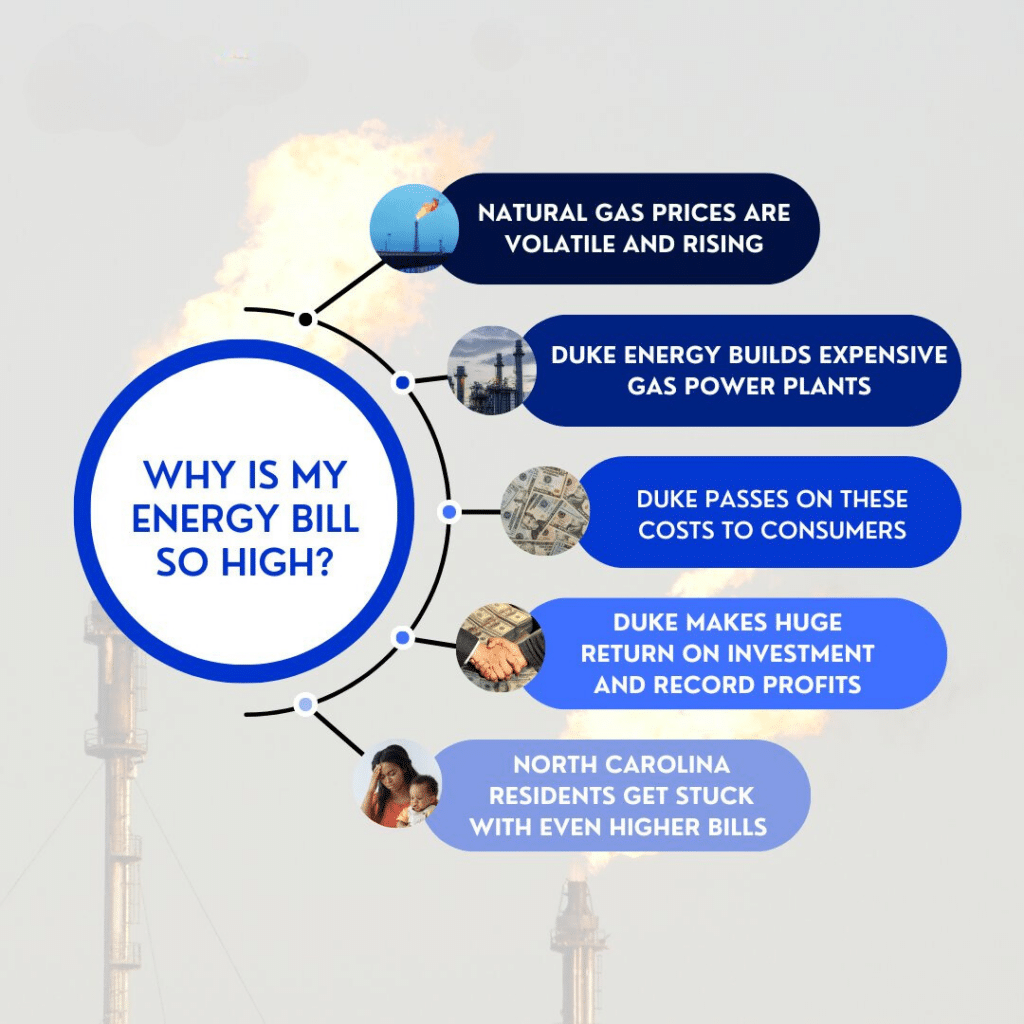Tell Legislature & Utility Commission to Stop Duke’s Outrageous Bills and Pollution
Duke Energy Promised Lower Rates. Instead, Winter Bills Are Spiking
Duke previously promised lower rates based on lower fuel costs. Instead, customers are now paying unexpectedly high bills.¹
Primary Cause of Bill Increases
Analysis by EQ Research on behalf of Environmental Defense Fund shows that the costs to fuel Duke Energy power plants with gas have been the primary driver of rate hikes for parts of its North Carolina territory since 2017. In the Duke Energy Carolinas (DEC) service territory, increases in fuel costs account for roughly 67% of the increase in residential retail rates since 2017, while gas accounted for 46% of the increase in residential rates in the Duke Energy Progress (DEP) service territory (where gas currently represents a slightly lower percentage of the generation mix) over the same time period.²
What This Means for You
Higher energy bills. More pollution. That’s what happens when a greedy monopoly utility operates without appropriate oversight.
Duke could integrate more renewable, clean energy into its plans and save customers money.3 Instead, Duke has proposed the largest buildout of dirty fossil gas in the nation,4 along with incredibly expensive, unproven, small modular nuclear reactors.5 Why?
The More Duke Spends, The More Duke Makes

Duke Energy is a monopoly regulated by the NC Utilities Commission, which sets rates and approves spending plans submitted by Duke for energy generation and grid improvements, including the profit margin. Duke Energy is also a publicly-traded corporation whose primary goal is to make money for its investors. Duke is guaranteed a nearly 10% profit on its capital investments,6 while the cost of those investments and any increases in fuel costs are passed directly to customers. Duke also received the largest rate increase in history in 2023.7 So how did that work out for Duke? In 2023, Duke Energy made $4.3 Billion8 and their CEO was paid $21 Million in 2022.9
Duke Is Also Trying to Avoid Responsibility for Its Toxic Coal Ash

In January, Duke Energy was one of a dozen utility companies that asked the EPA to suspend rules for cleaning up toxic coal ash and relieve power companies of their obligations to prevent coal ash from contaminating groundwater.10 Unfortunately, this is not new behavior. It’s another example of Duke trying to avoid responsibility for pollution and pass the cleanup costs on to their customers.11
Tell The Legislature and The NC Utilities Commission You’re Tired of Duke’s Outrageous Bills and Pollution
Please make your voice heard. You can call your elected Representative or Senator at 919-733-4111 and/or contact the Utilities Commission by calling 866-380-9816.

REFERENCES
- https://www.wral.com/news/local/duke-energy-customers-bill-spike-raleigh-goldsboro-feb-2025
- https://www.edf.org/media/new-analysis-shows-reliance-gas-primary-driver-rise-duke-energy-power-bills
- https://rmi.org/business-case-for-new-gas-is-shrinking/
- https://www.sierraclub.org/sites/default/files/2024-02/2719%20NC-Factsheet%2005_web%20%281%29.pdf
- https://nclcv.org/cib11202023-small-modular-reactor/
- https://www.theassemblync.com/environment/duke-ratepayers-clean-energy/
- https://news.duke-energy.com/releases/duke-energy-carolinas-receives-approval-for-new-rates-in-north-carolina-implements-new-programs-to-help-customers
- https://www.wfae.org/energy-environment/2023-03-01/duke-energy-seeks-big-rate-increase-in-central-and-western-nc-to-cover-higher-fuel-costs
- https://www.bizjournals.com/charlotte/news/2024/02/08/duke-energy-2023-earnings-2024-growth-utilities.html
- https://www.canarymedia.com/articles/policy-regulation/power-companies-pressure-trump-epa-to-roll-back-rules-on-toxic-coal-ash
- https://www.charlotteobserver.com/opinion/article228723029.html